#black sails meta
Text
The reason i love the ending of Black Sails (and why i hate like 80% of the discourse around it incidentally) is that no one is right! No one is wrong! They all make the most logical decisions based on who they are and John most of all.
The way I saw John apologists bending over backwards trying to frame it as an OOC decision because John wouldn't do that he loves Flint! at the same time John haters where feeling vindicated bc see he was a dick who only cares about himself and both sides making me claw at my face because the love was the point.
John would have not betrayed Flint if he didn't love him (and Madi)! Because then he wouldn't have cared if they died. But he does! He does so much in a way that is probably fully new to him and scary and it makes him act impulsively in a way he never did before (because as much as his actions often seem lackadaisical, he's a calculating mofo).
So he loves them.
He also, from the very first moments we meet him, has the biggest survival instinct of anyone. He doesn't care about principle or honour or cause he cares about survival.
He's managed to work for this cause and he's applied himself and i think at the moment of the story the Betrayal happens he's even really on board, but a tiger cannot change his stripes and so John Silver cannot change that his fundamental motivator is survival.
And because he loves Flint he wants him to survive more than he wants the cause to win only there he comes into conflict with the fact that Flint's main motivator is the Cause. He and Madi are creatures of principle of "The Cause Is The Cause Because It Is Worth Dying For".
So the confrontation in the forest is exactly this: Flint following his main motivator of the Cause before anything, because that is what he lives for and John just needing him to live, because you can't care about anything when you're dead.
And so it's tragic and heart wrenching because if John hadn't learned to love so well, so deeply, so earnestly throughout the story he would have let Flint go and continue to fight, but he did and he does so and he couldn't.
351 notes
·
View notes
Text
In discussions about the finale of Black Sails, one of the things I often see is folks hard-focusing on Flint's fate, in an either-or binary fashion, usually presented as "Which do you believe-- that Silver killed him? or sent him to the plantation?"
Now, for posterity's sake, gonna mention a few things-- first off, that's simply not thinking broadly enough. There are farrrr more than two options here and I've come up with my share of the reallyyyyy bad ones for sure. Whatever your mind chooses, none of those are happy endings anyway, there are bittersweet, bad, and worse endings all the way down. (They are paused, they are in a time loop, and also all endings and no endings are happening simultaneously)
But also, the more cogent point is that, it doesn't actually matter what happened *to Flint* The story is... not actually about him at that point. We have transitioned from Flint as protag to Silver as protag, setting up for (the fanfiction that Black Sails has ended up making of, ugh, king shit) Treasure Island.
And so, I just, don't find it to be of particular interest exploring what we think Flint is actually doing or if he's alive for real. What is EXTREMELY interesting to explore though is how Silver's speech at the end to Madi is sort of giving Thomas back to Flint as a pacifier/comfort object, but how... Silver is giving Flint that thing in his own mind as his own type of pacifier/comfort object.
That's the REALLY chewy bit. What actually happens to Flint is not the purpose of that scene for me, of Silver's recounting of events to Madi. It's more about... projection. It's about how Silver is dealing with whatever happened to Flint/whatever he did.
And I just feel like it's missing the point to focus so hard on if Flint is alive or not.
He is the ghost of the story regardless, that's what's important. He's going to haunt the narrative for the rest of everyone's lives. No one has been untouched or unscarred by coming into contact with Captain Flint; he has a forever legacy. I'm not the first to call him this, but he's Schrödinger's Flint and he's staying that way.
But this?
"No. I did not kill Captain Flint. I unmade him. The man you know could never let go of his war. For if he were to exclude it from himself, he would not be able to understand himself. So I had to return him to an earlier state of being. One in which he could function without the war. Without the violence. Without us. Captain Flint was born out of great tragedy. I found a way to reach into the past... and undo it.
There is a place near Savannah... where men unjustly imprisoned in England are sent in secret. An internment far more humane, but no less secure. Men who enter these gates never leave them. To the rest of the world, they simply cease to be.
He resisted... at first. But then I told him what else I had heard about this place. I was told prominent families amongst London society made use of it. I was told the governor in Carolina made use of it. So I sent a man to find out if they'd used it to hide away one particular prisoner. He returned with news. Thomas Hamilton was there. He disbelieved me. He continued to resist. And corralling him took great effort.
But the closer we got to Savannah, his resistance began to diminish. I couldn't say why. I wasn't expecting it. Perhaps he'd finally reached the limits of his physical ability to fight. Or perhaps as the promise of seeing Thomas got closer... he grew more comfortable letting go of this man he created in response to his loss. The man whose mind I had come to know so well... whose mind I'd in some ways incorporated into my own. It was a strange experience to see something from it... so unexpected.
I choose to believe it... because it wasn't the man I had come to know at all... but one who existed beforehand... waking from a long... and terrible nightmare. Reorienting to the daylight... and the world as it existed before he first closed his eyes... letting the memory of the nightmare fade away.
You may think what you want of me. I will draw comfort in the knowledge that you're alive to think it. But I'm not the villain you fear I am. I'm not him."
This is the speech of a man who is self-soothing, who is spinning himself a tale, who is projecting, who is coping.
and THAT is just, way chewier, innit?
#Now that's just from a canon point of view#once we start to delve into like fan fiction#Because fic must necessarily change the story and change canon because it's creating something new#so of course then figuring out what you want to do with flint post canon is necessary#but for me fanfiction is a different realm than canon only based meta conversations about the show#black sails meta#long post#black sails#john silver#james flint#thoughts#black sails spoilers#I was coaxed into writing my group chat meta into a post by the Committee mwah
501 notes
·
View notes
Text
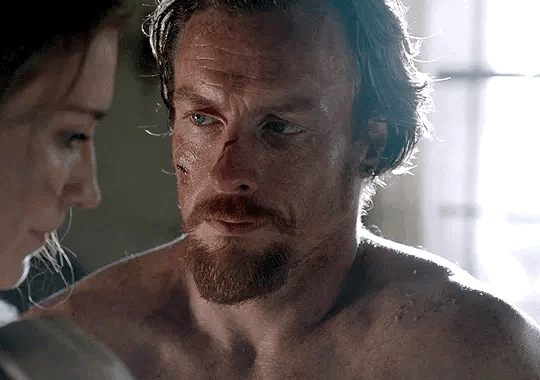
There’s been a lot of discourse about the nature of James and Miranda’s relationship. There’s even been a lot of discussion on my podcast about it. One thing I want to make clear is that my podcast is a platform for discussion on all points of view. I’m not going to agree, 100%, with everything that’s said, but it makes the views of my guests no less valid. There’s no right or wrong, here, because this is art and therefore, it is subject to interpretation.
My intent, however, is to attempt to get as close to the original intent of the actors as possible because we look at a show or a film or a play as going through several layers of distillation. Each level purifies the intended narrative leaving its truest essence.
When we make a reduction sauce using an alcohol of some kind, let’s say a red wine, the heat applied to it burns off things we don’t need for flavor. You’re never going to get drunk off of red wine reduction because there’s almost no alcohol left in it. That all gets burned off, leaving only the flavor components, which is what we wanted all along, anyway. We want that extra element that enriches the flavor of the steak, by adding nuance.
So let’s take apart that meal.
We start with the birth of the idea. The story kicks around in an author’s head, trying to get out, growing bigger and more persistent until it outgrows the confines of the mental box inspiration is stored in and has to be let out. That idea, that’s the cow.
The author raises that idea, feeds it, watches it grow, and then, ultimately slaughters it. That sounds awful, but once you have that idea pulsing, growing, evolving and then finally commit the final draft on paper, it is a kind of death. The life of the story comes to an end and it becomes memorialized in a mausoleum. Readers will come to visit, spend time with it, lay down flowers, cherish it, and mourn its passing.
The next level is adaptation. That’s the steak. There are many ways you can slice the story, large roasts encompassing the whole story or a smaller, hyper-focused character study fillet mignon.
A writers room gets hold of the cow and carves it up. They choose what gets cooked and what gets tossed. A GREAT group of writers saves the bones. They take in the entire supporting structure of the piece and while the whole story may not make it onto the screen, they will have slow roasted the bones for a stock. When you watch a show like Black Sails, where themes are introduced that won’t fully be explained or explored until several seasons later, that’s what that is. It is the stock being used to flavor the whole dish. You’ve distilled the entire cow to its purest essence and so every scene, every line of dialogue, every acting choice, encompasses the entirety of the story. A line from episode one is defined by knowledge of the finale and in regard to dialogue, defined by an actors’ knowledge of a character’s backstory. There are many writers rooms who are creating the bones of the story as they go, which means they aren’t starting with a rich stock. You can’t trace back character motivations or choices to begin with because those motivations changed throughout production.
Black Sails, again, isn’t one of those shows. Steinberg and Levine came into the writers room with their stock pot full and sloshing, spilling story everywhere. The richness of the details they were laying can make season one a bit hard to consume unless you are ready for a story on that level. Viewers need to come to the table with some bread to sop up all those character details because we WILL need them later.
Over the course of finalizing scripts and blocking out episodes, the steak is cooked. Like any great steak, this story is medium rare. More juice comes out with every bite. It’s what makes the show infinitely rewatchable. It continues to cook on the plate, but because it wasn’t overdone, it never dries out.
When the actors get ahold of it, that’s the reduction sauce we were talking about. That sauce provides nuance and flavor. That’s the emotion. A line of dialogue on a page is just ink. It’s nothing until it’s spoken aloud. And like any bit of language in this world, it’s subject to interpretation. In this case, it’s the actor who does the interpreting.
I spoke on the podcast about the art of subtext and how huge a role it plays in Black Sails. One example we used is Jane Eyre. It’s one of the most frequently adapted novels in the English language and with each adaptation, we get a new version of our characters. The most volatile and subject to change is Rochester. There are MANY versions of Rochester that I find appalling (including the original beast in the book), but each actor has formed him into something else, based on their performance. Toby Stephens takes Rochester and turns him into a silly tragic romantic, broken many times over by a society he never really fits into, despite the status of his birth. He connects with Ruth Wilson’s Jane because she fully and happily inhabits that space on the fringes that Rochester thinks he needs to climb out of. Jane takes his hand on the outside of the wall, turns him away from the guarded palace and shows him the wild world that was at his back this whole time.
This is what Toby Stephens, Luke Arnold, Louise Barnes, Zethu Dlomo, and really all the actors for whom their subtextual choices make them reflect like prisms, have done with their performances.
In the final distillation, character motivations and emotions are finalized by the actor. Writers can pontificate, the source material lies dead in its lovely tomb, but stories live and breathe by their storytellers.
What we’re left with is Toby’s face telling the world how deeply Flint loves Silver. Every single choice tells this story.
We’re left with Luke showing us how much Silver is repressing in his feelings for Flint. Luke’s face shows us an incredible depth of feeling and a door slamming shut.
We’re left with the incredible intimacy between James and Miranda, which speaks of a decade of shared physical intimacy. There’s an openness, a freeness to it until the moment in episode 3 when Miranda learns that James has found the Urca and is leaving soon to pursue it. She gives some of it away when she says “I thought I’d have you all to myself”. She is mourning the loss of intimacy that she only gets in short windows of time. They aren’t strained because James isn’t attracted to her, but because he’s rarely there. She has him for a few days at a time before he’s off on another hunt. The coldness starts from the moment he tells her he’s leaving in a few days because I believe she thinks he won’t be coming back, that this is the hunt he won’t survive and she’ll finally have lost both James and Thomas. From the moment Richard Guthrie darkens her door, she’s looking for a way to weaponize him and get them out. For her, it’s a race against the clock and she’s willing to sacrifice a bit of her relationship with James in the present to secure happiness for them in the future.
This is also why James still has sex with her before leaving, even though he’s furious for her reading Meditations to Richard. This is how they connect. They connected through physical intimacy in the flashbacks, as well. Him stroking her thumb in the carriage before the kiss. Tactile contact to seal their understanding of each other. Miranda bracing her hands on his chest during important moments in the Hamilton’s home, something she also does to Thomas, to show physical connection, physical intimacy. Miranda thrives on physical touch.
To think that, for 10 years, James is lying there like an object for Miranda to use, is, to me, short sighted. To think that James doesn’t love Miranda outside of a group, is also ignoring the fact that, 10 years on, James will not leave on a hunt (angry as they both are) without physically connecting with her, trying so hard to reach beyond his anger and the wound freshly opened from sight of that book he’s chosen not to look at for probably the better part of those 10 years. The way his hands hover over her back after she comes and he desperately wants to be with her in that moment, like the best of their moments, but he just can’t, speaks to the depth of his love for her.
So many fans of the show point to this sad sex scene as one of the most important character moments for James and Miranda, but I consistently come to the opposite conclusions about WHY it’s important and what we learn from it, because I’m taking my cues from the actor’s choices, not the director or the writers. On the page, in plain ink, he hates having sex with her. Toby and Louise show us, however, that they are trying to recapture a thing that is fleeting, reaching out to each other to patch up an old wound from which the scab has been picked off, leaving it seeping and raw.
From Toby’s performance, regardless of the words he uses years later to describe it, we see not a character who “loves men” or a character who “loves women”, but a character who LOVES. I don’t see Flint defining that love in terms of boxes and parameters. He’s a character who must be coaxed out, but then loves without reason, without a safety net, as he proves with his love of Silver. As was also referenced by a guest on the podcast, he places a sword in Silver’s hand and says “do it”.
Anyway, this post got away from me and took several turns, but the love between James and Miranda being dismissed by so many in the fandom has been bugging me for a while and I just needed to emotionally vomit on tumblr.
#black sails meta#cooking metaphors#my culinary degree isn’t ALWAYS useless#James Flint#Captain James Flint#James McGraw#Miranda Barlow#John Silver#flinthamilton#SilverFlint#silverflintmadi#Toby Stephens#Louise Barnes#Luke Arnold#Zethu Dlomo#Black Sails#sexuality in a historical context#the almighty subtext#acting choices were made#When the lips and the eyes are telling two different stories it’s the eyes that tell the truth#no daylight between you and I
105 notes
·
View notes
Text
types of story that different black sails characters think they're in:
jack: typical underdog overcoming unbeatable odds story; he is the main character and the show is 100% about him and his joseph campbell hero's journey. he is like achilles seeking eternal glory. he is also like gilgamesh, seeking immortality because he's afraid of death
flint: one of those fairytale retelling stories from the villain's pov; he is the fire-breathing dragon/big bad wolf/wicked witch that his village has ostracized, chased out of his home with pitchforks and torches because they feared him and what he is and what he stands for. he knows that in another show, a more popular show, the story would be told from the pov of the villagers about the dangers that lie beyond the village walls and into the forest...but this is HIS show and in HIS show HE is the one that survived the villagers not the other way around and HE is the one that has been wronged and he WILL see them pay for it
miranda: at first she thinks she is the witty and cunning heroine of a regency period romance novel. she is critical of high society and it's archaic and sexist traditions, turns her nose up at the institution of marriage and yet against all odds finds a true partner in thomas. she thinks herself happier and smarter than her peers, for finding a way to explore her sexuality freely and still keep her high status. she is caught in a whirlwind romance with a handsome naval officer and well....then her story turns into a tragedy and a decade caught in lifeless loveless joyless limbo where she is sidelined into the background of someone else's story
max: overly aware that she is in A Story and that she is Not The Main Character; the spotlight is never on her, she will never take centre stage. in fact, she is in the wings, or perhaps watching the show from the back of the theatre as the stage manager, setting the scene and directing others to pull ropes, shine lights, open and close the curtains so that other actors can strut and fret their way around the stage
billy: revenge quest story! thinks he is the good guy, there to protect his friends and get revenge on the tyrant who killed his father. gains some genre awareness and realizes that he is not, in fact, the main character, but rather a side character caught in a romance between his captain and quartermaster and if he really wants to survive he's really gotta break them up
madi: a story of hope told around a campfire, passed on from generation to generation so people don't forget about the time that an island of maroons stood up to a seemingly eternal and unbeatable empire. some days, it's a cautionary tale, on how volatile solidarity can be with divisions like class, race and gender .... or how revolution necessitates violence that people who are comfortable in their oppression rather not pay... but no empire lasts forever and nothing is inevitable. the story sticks in the hearts and minds of future revolutionaries and someday someone somewhere will pick up the torch and continue the fight
season 1 walrus crew: workplace comedy
silver: [redacted]
#black sails#black sails meta#rare black sails meta text posts where i look back on it like....yeah my takes could be wrong here#i was like “huh i wonder what genre of show the black sails characters think they're in” and then blacked out#but the inherent tragedy of characters in a story IS that they dont know what genre of story theyre in#so realistically i dont think any of them would actually think this stuff through except maybe jack max and flint#anyways if it helps i did take a media literacy class in university <- things that are embarassing to admit when my takes end up being wron#charles and anne: you guys live in a story? well we live in the moment so
797 notes
·
View notes
Text
There could never have been a happy ending to black sails. If the writers had said “and so they won the war and freed all the slaves and defeated all the English and lived happily ever after“, we would not have believed it, because we know, historically, that it isn’t true. And even a smaller, less complete victory would have been unbelievable. “They lost the war but found happiness regardless” - would they though?? “Silver made them give up the war and Madi and Flint forgave him” - are you sure?? Madi and Flint both made their entire purpose a war they were destined not to win. Both of them would have sacrificed Silver, and anyone else, to win it, and it would have been in vain. There was no way for them to be happy, not ever.
So what the writers gave us in the end was a soothing story. There are days when I believe that Flint is happy in Savannah with Thomas. There are days when I believe that Silver and Madi found a way to move forward together, and there are days when I don’t. In the end, a story is true or untrue depending on people’s belief. If you want to believe that black sails has a happy ending, then you can, and it does. And if you want to believe that the ending is horrifying, then you can, and it is. I think one of the most brilliant things the black sails writers ever did is giving us an ending that is never just one thing, just like Silver, just like Flint, just like the entire show.
232 notes
·
View notes
Text
Starting a fresh post (with permission, so as not to clog their notes), I think what Jay said about the narrative purpose of Flint's ambiguous ending can be illustrated by relating it to Thomas. Obviously as soon as we enter the realm of fic it becomes necessary to pin things down and choose a direction to go with, but in the show itself we know very little about Thomas and that's on purpose. He's on screen for all of 30 minutes (I checked). He's not supposed to be a fleshed out character with complex motivations in the same way the core ensemble is. He's a tabula rasa, he's a ghost in Flint's memory; what he thought about the nuances of his own ideas or his relationship with Flint don't matter. What actually happened to him doesn't matter. Only what Flint thinks happened to him matters, only what Flint thinks about their relationship matters, because Flint is the one who is left and who Flint's story is about.
Then the same thing happens to Flint when Silver becomes the main character. Even though we, the audience, know Flint, what we know about him ceases to matter to the story - to the mechanics of the narrative - in the same way as what Silver thinks about him as Silver steps onto center page (of Treasure Island) and Flint becomes his backstory.
The tension generated in the transition from Watching Flint's Story to Watching Silver's Story is given strength by the unknowability of Flint's fate, and that tension is (part of) what makes the ending of Black Sails so solid from a craft perspective.
213 notes
·
View notes
Text
STORIES fucking stories.....flint is a story. a story told to james mcgraw in his childhood, a story taken up by james and turned into something tangible but something that is still in itself a story; flint is a character mcgraw wears. and james flint is a story. a legend, a pirate that strikes fear into people just by the mention of the name. captain flint. the story told to children in the colonies, in England, the story spread like wildfire as a reason to end piracy. the story told to sailors, to other crews. because men in these waters don't fear ships, or guns, or swords, or death. they fear flint. they fear the stories they've heard, the tales that are told. flint is the monster, the warning, the words whispered. flint. flint. flint. he haunts every action, every decision long before he meets his end. and eventually the world molds to fit the story; flint and james become one thing, cross a line where they are no longer separable. and then there's silver...oh is there silver. he has always been a story, a man with no past, a man crafted out of nothing but thin air, constantly contorting himself to be the truest version of the story he can be....the story needs an enemy so he is an enemy, the story needs a rock so he is the rock, the story needs a hero so he is the hero, the story needs a tragedy, so he is the tragedy, the story needs a reason, so he becomes the reason. long john silver is a story crafted to contain another story, to contain silver and flint and turn them into legends and preserve them in tales and both james and john end up becoming the stories told about them. this isn't who they are. but the stories are all consuming, will burrow their way through your head until you can no longer see the line between truth and fiction and in the end it doesn't matter what was true or what was untrue because the stories make it so; the story does what it wants and you have no choice but to change yourself to fit
#SORRY DOES THIS MAKE SENSE#I AM CURRENTLY NOT DOING WELL#THINKING ABOUT THIS FUCKING SHOW IS MAKING ME LITERALLY INSANE#DEAR GOD#the THEMES the NARRATIVES THE FUCKING STORIES BRO. DEAR GOD THE STORIES. THE FUCKING STORIES.#black sails#james flint#captain flint#james mcgraw#john silver#long john silver#black sails meta#(kind of.....mainly just me rambling tbh)
77 notes
·
View notes
Text
The way James doesn't say anything until Lord Hamilton starts in on Miranda. Yes, he would have inevitably stood up in defense of Thomas, but you can see throughout the dinner scene how he is holding back, staying quiet, allowing Thomas to argue with his father. But it's when Lord Hamilton starts taking potshots, nastily calls Miranda a whore, is when James stands up. His tipping point is when Miranda is disrespected, (it isn't the first time, either) and it's so...so...insane, because he stood up for both of them. Miranda and Thomas. He shot back against Lord Hamilton for Miranda as much as he did for Thomas, because he loved them both.
#black sails#black sails meta#james flint#captain flint#james mcgraw#miranda barlow#thomas hamilton#flinthamilton
209 notes
·
View notes
Text
the same man who wrote treasure island also wrote dr jekyll and mr hyde. and i just.
like, black sails has such a focus on true identity vs projected identity and maybe someday i’ll have more coherent thoughts on this but. mcgraw/flint as jekyll/hyde. [redacted]/silver as jekyll/hyde.
there’s just so much there that’s so interesting to me. if anyone has more coherent thoughts on this or if anyone else has written about this already pls share 🙏🏻
185 notes
·
View notes
Text
Black Sails Transcripts Site 🏴☠️
Hey folks! I've made a website that puts all of the (uncensored) Black Sails episode transcripts on a single page, so you can easily jump between episodes but also search all episodes at once.
This makes it easier to find quotes (especially if you aren't sure what episode it belongs to) and also makes it easier to find phrases or words that are used in multiple episodes.
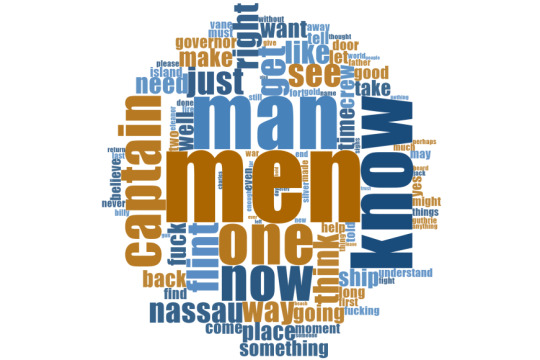
Additionally, I've included some word clouds along with downloadable spreadsheets of word frequency. The full, plaintext transcript is also included as a download.
Happy fic writing and analysis!
579 notes
·
View notes
Text
I'm watching 1.7 and the break in Flint's voice when Gates is questioning him in the stable and he's like "I'm trying to answer the question" is devastating. The facial acting that Toby is doing here is like, he does great body language here and the trembling voice and nervous swallowing and darting eyes, you can see him trying to stave off some kind of extreme anxiety attack.
Because. Like. God the flashbacks he must be having to London and Hennessey and Alfred Hamilton.
Anyway, what he is saying just gets more and more desperate throughout the exchange, but legit he is trying to level with Gates the only way that he can in this moment. There is no version of Flint right now who could tell the whole truth, bc of his background, bc of the trauma, bc of what happened last time he trusted someone like that.
So when we see what appears to be a mental BREAK, and he tells Gates his vision of sequestering a portion of the Urca gold for the future of Nassau and their men, that's him trying to explain his motivation the best way he can.
And the worst part is, he just sounds crazy and meglomaniacal and Machiavellian and DERANGED. It's exactly the wrong thing to say to Gates at that moment, they have already broken apart, it's too little too late, it's ten years too late!!
Gates is hearing a lying maniac being conniving and cold and awful about Billy. But tbh, when I hear Flint say "He fell. Why? What do you think happened?" I just hear someone that WE KNOW doesn't know in his heart of hearts WHAT HE DID, WHAT HAPPENED, and he just... it would be easier if someone just told him.
I know we joke about Flint being full of SHIT, and he is in MUCH of the show, he does SO MUCH LYING. But this entire exchange doesn't feel like that. It feels like he's cracking and reaching and grasping and trying. And he has no earthly idea what path he would even take to get Gates back on side.
Gates says, "This is what we do. You orate and you dissemble and I look the other way..."
And the saddest fucking part, the most tragic of the tragedy is that HE'S NOT WRONG. That is what they do!! and it's. It's over! It's too much!
But poor fucking Captain, he just... He doesn't know how else to be.
And with regard to SilverFlint, and their arc... I've been thinking this go round about why it's different from Flint's relationship with Miranda or with Gates or with anyone...
And, well... It really is just a case of finding deep understanding from a person you never expected, isn't it?
At first it is extremely begrudging, because he doesn't have another choice, unwilling allies due to strife. But eventually it does becomes voluntary.
At its core, I think the reason that relationship is different, is because that becomes clear to Flint over time, and then he is able to offer up all the sides of himself to be further collated and understood.
And then faster than the speed of fucking light we get to 3.10 and 4.9: "You asked me where I began, and I felt that you were entitled to an answer. To the truth." and "I cannot do it without you."
Silver says, "We might be friends by then" and by fuckin god they ARE. "As my partner as my friend" and "You know of me all I can bear to be known. All that is relevant to be known. That is to say, you know my genuine friendship and loyalty."
So, what I've been circling is... sitting down in the woods and just telling Silver everything that happened in London is exactly what he can't do with Gates in 1.7 :////
#when I think about it I feel like somebody is pulling my guts out slowly#this got a little long it's expanded from some discord rambling#thoughts#black sails#black sails meta#black sails lb
174 notes
·
View notes
Text
Importing my Twitter musings for maximum emotional damage. I’m . . . sorry? 😬
@jaynovz actually inspired this because we were talking about memories and trauma and how they relate to Silver in our chat for her episode of Reading Between the Lines Podcast. She mentions memories in a vault, which got me thinking about how James is doing the exact same thing. Oh! Which made me realize something else! Holy shit . . . that’s WHY he prods Silver for his past! That’s why he tells him how important all parts of him are, his present, his past, his trauma, it’s all important to embrace. Why?? It’s a lesson he learned from Miranda. One of the last.

Okay, I’ll stop screaming and just continue with my Twitter thread . . .
Once again thinking about how those flashbacks dance around James’ and Thomas’ love story up until episode 2X05. You can certainly hold to the belief that the only reason was to drop that twist mid-season, but let’s think about how we engage with memories.
Some memories are so overwhelming that we avoid them. We don’t have time for them. We tuck them away in a drawer in the darkest corner of our mind where we are convinced we will be safe from them. That’s all well and good if those memories aren’t shared with anyone else.
The flashbacks, we realize very early on, aren’t simply exposition. They exist in Flint’s present reality; memories triggered by Flint’s quest seemingly nearing its end . . . Thomas’s dream finally within his grasp. Equally important, they are triggered by Silver.
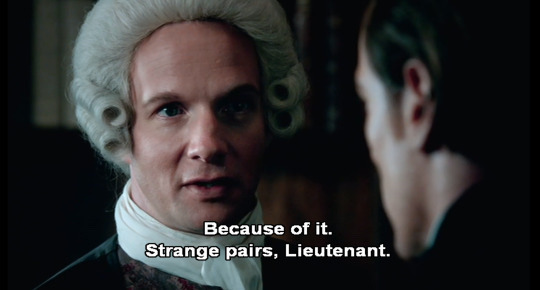
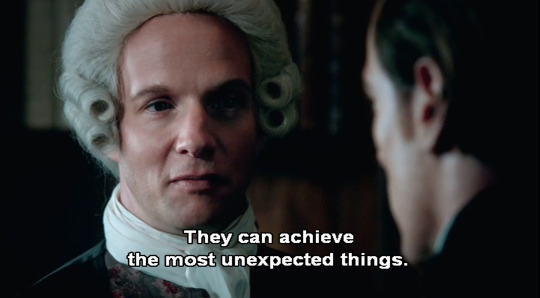
It’s very important to remember that we don’t get a single flashback until they are triggered by Silver working with Flint. He begins to remember Thomas because Silver reminds him, not of Thomas, but of himself. He’s now understanding how much of Thomas he’s embodied himself.

In season one, Miranda chastises James for never addressing his loss. For tucking Meditations on a shelf and hiding it away from himself. He’s angry not just because she shared that book with Richard Guthrie, but because she’s reminded him of its very existence.
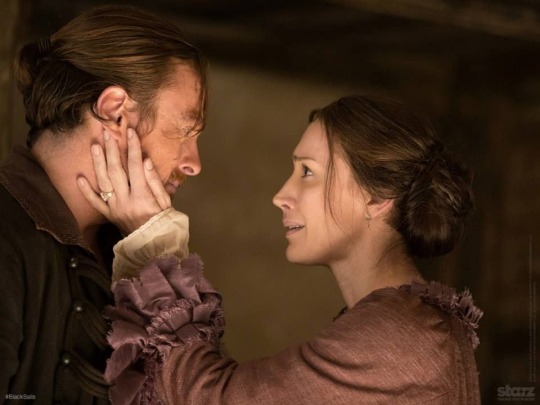
The flashbacks are all from Flint’s perspective, as he’s focused on his goal. He’s remembering their vision for Nassau, pushing on that bruise to continue spurring him onward, no matter the cost, no matter the casualties. He never brings up Thomas by name. Not once.
It’s Miranda who brings him up by name. Miranda who is desperately trying to get him to remember the love. Remember the true reason he’s doing what he’s doing. She knows he can’t. It’s too much. It’s too painful. And so every single flashback is from Flint’s perspective . . .
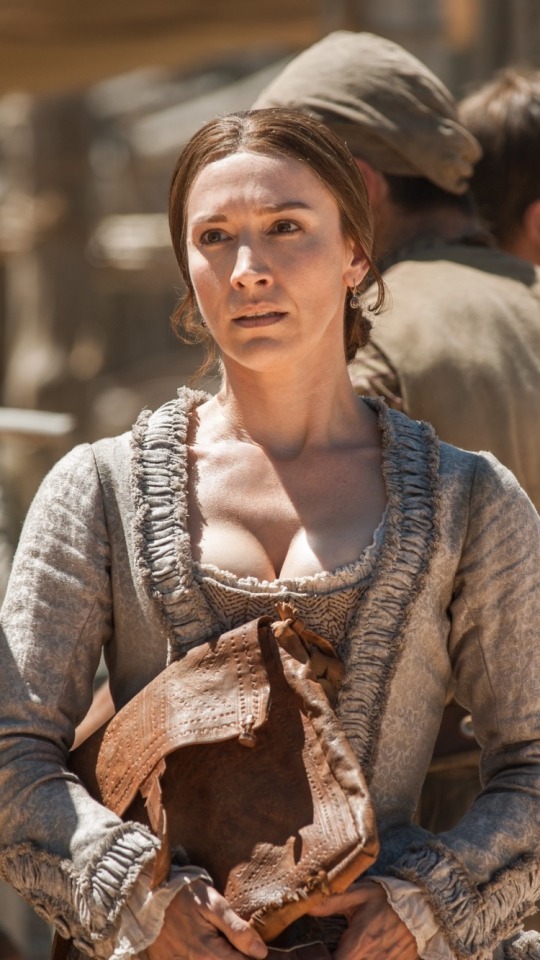
Until episode 2X05. When we see that dinner scene with Alfred Hamilton again, when we see that first kiss, it’s Miranda who is thinking of it. That’s HER memory of it because James still can’t look at it. It’s like staring into the sun.
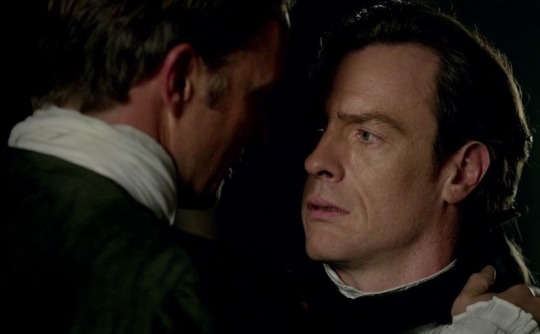
The writers weren’t skirting around the reveal, it was simply being told to us by a character too traumatized to give us the whole story. We needed Miranda’s perspective. She hands him the book and it’s the inscription that finally breaks him. Finally gets him to open that drawer.

But the memories tucked inside that drawer are not Miranda’s. He doesn’t go back to the dinner scene, to that kiss. What we see is what Miranda didn’t see. We see James’s memories of the book.
He couldn’t look at that book because it wasn’t the memory of a tender first kiss at dinner, it was the unbearable intimacy of sharing that book, the private intimacies and love that’s had time to breathe for a bit. Miranda calls it shame because she doesn’t have those memories.

So while it’s true that Black Sails was planned to build up to this reveal from its infancy, it’s equally true that James’s story is told in one of the most organic and ultimately honest narrative arcs I’ve ever seen.
So much of the beauty of this show is derived from the absolute mastery of the writers creating at the very peak of their craft and we should all remember that, during a time when those same creators, who have given us so much, are fighting to be compensated fairly.
Black Sails is the gift that keeps on giving, and onion one might never reach the center of. Considering all of this, I’m beyond excited to see what we are served up with the Percy Jackson series. If it’s anywhere close to the quality of Black Sails, we’re in for a real treat.
#black sails#captain flint#toby stephens#james flint#john silver#james mcgraw#luke arnold#long john silver#black sails meta#silverflint#flinthamilton#rupert penry jones#thomas hamilton#louise barnes#miranda hamilton#miranda barlow#emotional flailing#reading between the lines podcast
266 notes
·
View notes
Text
I have seen meta posts about Silver's last words to Flint and Madi:
"But I will stand here with you... for an hour, a day, a year... while you find a way to accept this outcome... so that we might leave here together. For if not... then I must end this another way."
"But I will stay. And I will wait. A day... a month... a year... forever... in the hopes that you will understand why I did what I did."
About how it's a parallel (true), how that's kinda queer (true), how it's fucked up and evil of Silver to assume they will grow to agree with him (true), how it's insane of him to have more hope in Madi forgiving him than Flint (so true) but I haven't seen anybody note that it's also a curse Silver places on himself.
John I-am-happy-to-find-some-other-place-to-survive Silver from nowhere belonging to nothing will stay. And will wait to be accepted. An hour, a day, a month, a year, forever.
It's a hell of his own making, the door is open and he won't leave.
320 notes
·
View notes
Text
since the debate about whether or not silver lied about flint in the finale is making the rounds again i thought abt it again and my conclusion is not necessarily that silver lied and killed him, but that silver lied about Something.
i am not sure about which part, it could be anything from flint being dead to flint being in savannah but thomas being dead to flint getting shipped to london idk idk! somewhere in the story he is telling is a lie and even if it only was that he would wait a day, a month, a year
because i think the thing is that when he sold the war for madi THAT was true. that was his grand gesture of truth. but i dont even think it was about her, i think that choice was about him admitting to himself that if he let this war happen this would turn Too Big, Too Visible and too final for him to weasel out of in case he ever needed to. no more place to run for someone who is a nobody from nowhere u know? he needed to get the fuck OUT of there
and for the record i don't think that made his love for madi any less true i think he really thought he loved her but i think he never understood her the way flint did and this was just the breaking point where he was unable to fill the space flint and madi made for him anymore and snapped back into his old self-preservational habits bc he was under a lot of stress and pressure except This Time, unlike before, his actions affected others as well and he cared about it
and as much as silver is obv the most repressed guy alive i think he is v much self aware, at least insofar as that awareness extends to others' perception of him. so i think he Knew this truth would be unforgivable and i am sure he also knew how madi would react, bc he knows her principles, even if he cannot necessarily rationalize or understand them himself, so he knew he would lose her for this (flint voice you're too smart not to know this) but :) he loves her! and he is loved by her! and from what we know of him this seems to be something incredibly rare and unprecedented for him he is literally starved for care and affection bc he is Mr Detached Solo Nobody Fakename plus lbr he is pathetic ♡ so obviously he would try to hold onto that love despite the betrayal! but how?
and that is where i think the lie comes in: imo he had a lie Somewhere In All Of This to soften the truths impact bc he knew what would happen and even if he saw no other way around it he wished there was another way around it (there was. just not to him not like this) so he lied to make it less terrible bc what can a lying liar who lies do when he knows the truth is the worst thing to say?
#yes this is basically just my tags from the poll post but w additional rambling#do u get it tho. do u see my vision#elsewhere ive said that the moment flint and silver split is the moment the silver who is loved splits from the silver who goes on#but the same can be said about madi. the moment she is taken there is a shift.#anyway i shant elaborate further it is bedtime (1am) and ive got uni tmr so. goodnight#cavetext#black sails#black sails meta#<- ig??? idk
194 notes
·
View notes
Text
I've recently seen a few people talking about media literacy in relation to Flint's sexuality and labels and figured I'd throw in my two cents on the discourse that seems to pop up every few months.
Because, I honestly think it does a disservice to Black Sails as a whole to focus on "gay vs. bi Flint" because like... does it matter? if Flint only has attraction to men, that doesn't change the fact that he's canonically, willingly, had sex with women (namely Miranda). But, on the other end of the spectrum, it's just as important to recognize how, societally and culturally, gender is a construct, which will inherently mean that sexuality is fluid! Flint can be a gay man with some level of attraction to women (hell, the majority of the fandom agrees that Anne is a lesbian, yet she's clearly in love and has sexual attraction to Jack, and that doesn't take away from her lesbianism!), and that attraction doesn't make him any less of a gay man! Or he could be bisexual, and that doesn't take away anything from the overarching narrative of his queer relationship with Thomas! The focus on a single 'correct' interpretation of his sexuality, in my mind, takes away from what the show is really trying to say about sexuality, which isn't the "this way" or "that way" to be queer, but the overarching connection that struggle and strife can bring to a community. (For a similar issue, see James Baldwin's response to critics arguing whether the main character from his novel Giovanni's Room is gay or bisexual, his response is incredible.)
And, on the other hand, it's also not entirely accurate or even fair to try and ascribe modern labels and perceptions of queerness to a character that existed long before those terms were even coined? In Flint's time, homosexuality was something a person did, not who a person was. While, yes, his queerness is inherent to his journey as a character, and he very clearly views it as a part of his identity, it's also very much worth noting that two things (homosexual love and desire, and heterosexual love and desire) can coexist, and not either way take away from his narrative as a whole.
Finally, then, there's the common thread of 'media literacy' in determining Flint's label (which, again, I honestly think is just a non-issue because it has such little impact on anything in meta discussions?). To present an opinion like "Flint is gay" is an example of an interpretation, one which can and should exist among others! To have a single, 'correct' interpretation of a piece of media, especially one like Black Sails, is an inherently flawed idea, because every interpretation should have its own merit on its own. Flint can be both bi and gay, and both arguments have perfectly equal weight, but in the end, it doesn't really matter in the grand scheme of Black Sails meta. Either way, Flint is queer, and that queerness was a defining feature of his character for the rest of the show. To assign such importance to "gay or bi" just feels unimportant.
#this is about the meta interpretations of flint#not personal headcanons#black sails#black sails meta#pip talks black sails#james flint#captain flint
264 notes
·
View notes